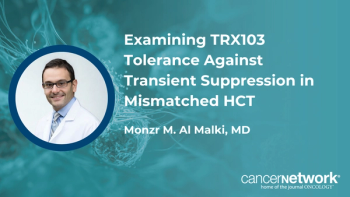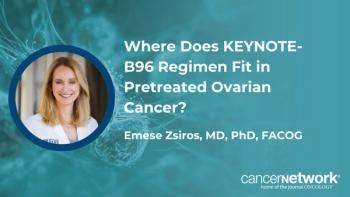
- ONCOLOGY Vol 14 No 3
- Volume 14
- Issue 3
Bexxar (Tositumomab, Iodine-131 Tositumomab) Can Be Safely Administered in Relapsed Low-Grade or Transformed Low-Grade Non-Hodgkin’s Lymphoma Patients After Prior Treatment With Rituximab: Initial Experience From the Expanded Access Study
Tositumomab/iodine-131 tositumomab (Bexxar) is a new radioimmunotherapy for relapsed and refractory low-grade and transformed low-grade non-Hodgkin’s lymphoma (NHL). Iodine-131 tositumomab is a radiolabeled murine immunoglobulin
Tositumomab/iodine-131 tositumomab (Bexxar) is a new radioimmunotherapy for relapsed and refractory low-grade and transformed low-grade non-Hodgkins lymphoma (NHL). Iodine-131 tositumomab is a radiolabeled murine immunoglobulin G2a (IgG2a) monoclonal antibody directed against the CD20 antigen. With the availability of two monoclonal antibodies (tositumomab and rituximab [Rituxan]) containing murine protein and both directed against the CD20 antigen, it is important to establish the safety of using tositumomab in rituximab-treated patients.
As of April 8, 1999, 30 patients enrolled in the expanded access study had previously received treatment with rituximab. At study entry, 21 (70%) of 30 patients had low-grade NHL and 9 (30%) had transformed low-grade lymphoma. Patients had received a median of three (range, one to nine) prior chemotherapy regimens.
Baseline patient characteristics included: a median age of 57 years; 16 male patients; and a median time from diagnosis of 59 months. Of the 30 patients, 27 (90%) had stage III or IV disease; median International Prognostic Index (IPI) at study entry was 3.0; 20 (67%) patients had elevated lactic dehydrogenase (LDH); and 14 (47%) patients had a tumor diameter ³ 5 cm. Ten patients had positive bone marrow biopsies with < 25% lymphoma involvement.
All patients received a saturated solution of potassium iodide or Lugols solution and a single dosimetric dose (450 mg of tositumomab intravenously [IV] over 1 hour, followed by 35 mg of tositumomab radiolabeled with 5 mCi of iodine-131 over ½ hour) and then had three whole-body counts obtained over the next 7 days. The whole-body counts were used to calculate the required activity (mCi) to deliver the desired therapeutic dose (65 cGy for platelet counts of 100,000 to 149,999 cells/mm³ and 75 cGy for platelets ³ 150,000 cells/mm³). Twenty-eight patients received a single therapeutic dose (450 mg of tositumomab IV over 1 hour, followed by 35 mg of tositumomab containing an appropriate activity [mCi] of iodine-131 to deliver the specified total body dose [cGy] over 1/2 hour) 7 to 14 days after the dosimetric dose.
Two patients experienced transient grade 1 adverse events during the dosimetric infusion, and no patient required infusion rate adjustments. Median duration of the tositumomab predose infusion during the dosimetric dose was 1.0 hour (range, 1.0 to 1.1 hour).
Two patients did not receive the therapeutic infusion because of progressive NHL. No patient experienced an adverse event during the therapeutic infusion or required an adjustment or discontinuation of this infusion.
One patient was positive for human antimouse antibody (HAMA) at the time of study entry and was treated without complications. Two patients have developed HAMA reactions following treatment with tositumomab.
CONCLUSION: Tositumomab has been safely administered to patients with relapsed, low-grade or transformed, low-grade NHL who had been treated previously with rituximab.
Articles in this issue
almost 26 years ago
FHIT Gene, Smoking, and Cervical Canceralmost 26 years ago
IOM Medical Error Estimates Questioned, But Legislation Consideredalmost 26 years ago
Less Toxic Therapies for Hodgkin’s Disease May Reduce Secondary CancersNewsletter
Stay up to date on recent advances in the multidisciplinary approach to cancer.










































